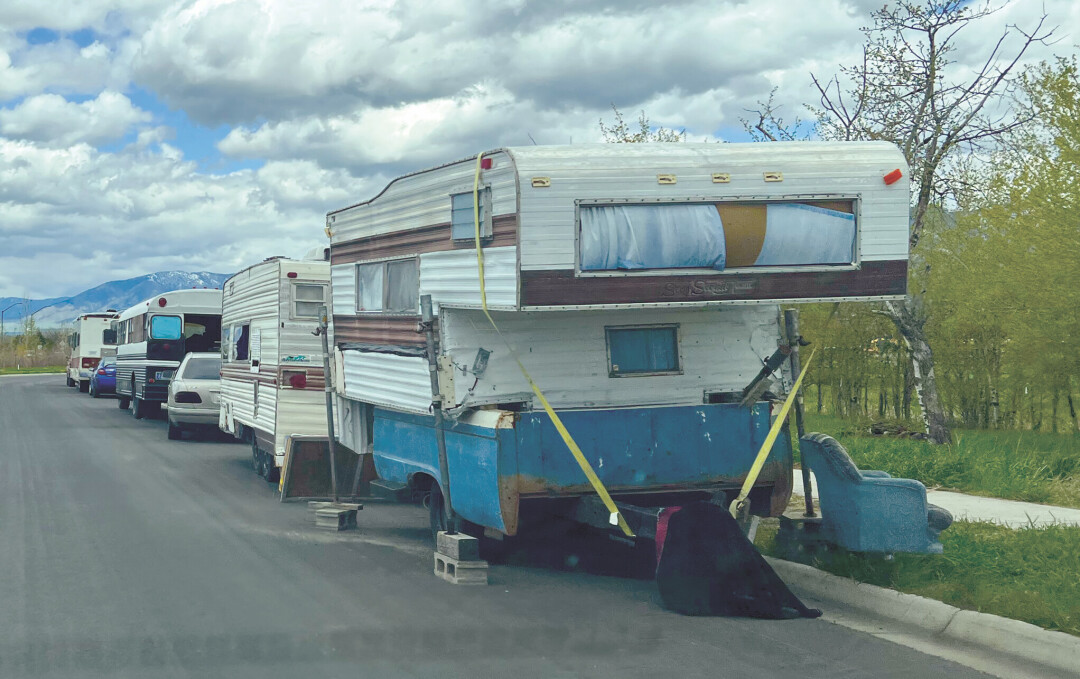What's Your Beef? Over-homed Homeless Are Running and Ruining Our Town
Steve Kirchhoff | Saturday Jun. 1st, 2024
The homeless underclass in Bozeman is considered by many to be a public nuisance that demands a response from local government, which should clear the public domain of this unwanted, wandering, rootless human element. And yet, at the same time, Bozeman is frequented by a rootless upper-class that is perpetually on the move, crashing only momentarily at their Bozeman property while on their way to multiple other properties held in multiple other locations across our country and world.
The latter group, the over-homed wealthy nomads of America, gets first-class treatment from local officials. Today in Bozeman and in many other unfortunate locales across our nation, it is enviable for wealthy people to be rootless and wandering, while the poor in the same condition constitute a public danger. This is a mistake in judgment. The homeless poor elicit shock and disgust, while the over-homed rich get zoning laws rewritten to facilitate their reckless and careless lifestyle.
Homeless people temporarily park trailers and pitch tents and lean-tos on public rights of way, and, after departing, leave no permanent trace of their ever having been in town. On the other hand, economic elites demolish entire swaths of Bozeman’s historic neighborhoods to construct luxury condos from which they collect high-dollar rent when not occupying them—which is most of the time. And the mid-rise “fast-casual” buildings erected to amuse transitory elites do permanent damage to housing affordability and the character of our city.
These are two kinds of homelessness, and they are connected.
People with still-clear eyes plainly see that elites alter our city physically, economically, and culturally—all to the detriment of local people, whose cost of living increases as their quality of life declines. More Bozeman citizens than ever are wise to the footloose elites’ negative transformation of our place—yet, when locals present their concerns to the city government, our concerns fall on deaf ears.
This deafness has caused many longtime residents to believe their elected representatives must have stopped listening to them because they started listening to someone else. The question is, to whom is the commission listening, if not to the people who elect them and provide them with earnest concerns, suggestions, and criticism?
It seems clear that the commission has sided with the rootless elite—or more accurately, with their representatives—the developers and financiers and investor class, the greasy dealers who find ways to facilitate, to promote, and to extract profit from, the wanderings of the shifty elite class.
It is to this sub-class, composed of wannabes and wheeler-dealers, that the commission turns their attention—to the “concierge class.” Concierges work for and build for elites; as highfalutin’ servants, concierges satisfy elite whims by predicting and guiding them; they give soft landings to elite rootlessness with turn-key, pass-through vacation properties in Bozeman and other locales that provide momentary glamorous backdrops for their maundering ways.
Not only has the concierge class earned the respect of the Bozeman city commission, but the commission seems duty-bound to it, perhaps because concierges represent the successful class, the “winners” in the struggle for survival. Yet this obeisance is not restricted to the Bozeman city commission. Far from it: local obligation to elites reflects the hegemony of wealth in the whole of modern American culture.
American social and economic and political life is ruled by owners of large amounts of wealth and by the slippery unaccountability that wealth can buy. In our time, economic elites lead fluid lives; like water, they always find the lowest spot in the system to flit through, slipping out of the grasp of responsibility. To be rich and “successful” in this way means to have earned the privilege to leave others—the second-place finishers, the also-rans, and all the rest—to fend for themselves.
There is always someone, isn’t there—a designer, a lawyer, an engineer, an investor, a local official or bureaucrat—who seeks a way to be helpful to elites? Concentrated, unaccountable wealth always meets with concierges. Rather, it creates them out of thin air, and leaves nothing but thin air for regular people to house themselves in. Concierges get richer as they get closer to the thrillingly fluid class—and they join elites in unaccountability, the powerful rush of actually feeling the effect they have on the world without being answerable to the effect.
But elites influence more than just concierges: they influence the whole of society. Because the elite class needs it, a new law is drafted; on the other hand, some old law, an annoyance to wealth-generation, is repealed, to the benefit but not to the gratitude of the power-elite. Old things, things of humble origin, non-transactional things, things stuck in the ground, people stuck in their ways, the very notion of groundedness—all are up-ended, put into motion for motion’s sake and thrust into errors of no one’s making and no one’s concern.
This is the modern world. A homeless world. Our world, and our town.
While they move about, obligating others to their service, the accommodations constructed for their ephemeral appearances are in some places sunk into the earth, irremovably, and their influence is inscribed into the local zoning code and gashed into the very nervous systems of longtime local people who, while watching the senseless mis-use of their beloved home ground, struggle to keep their own senses intact.
Under the crushing power of concierge bulldozers, landmark structures are pulverized into amnesia. Aging kit homes, eccentrically re-modeled worker houses, and tiny cottages are flattened, emptying our place of its past, re-fashioning old neighborhoods with. Whole neighborhoods once worthy of love are re-purposed into forgettable franchise realms made of vacuous forms one seemingly could put one’s hand through without resistance.
I don’t mean to blame the city commission for elites’ reckless and multi-dimensional endangerment of group life, only for their unconscious (I hope) complicity in it. It isn’t too much to ask the city commission to consider a possibility: Namely, that the reason more and more city residents are bitter, angry, and dejected about the direction of city life has everything to do with the predominant influence of an elite class in our city—and concierges in city hall.
| Tweet |
